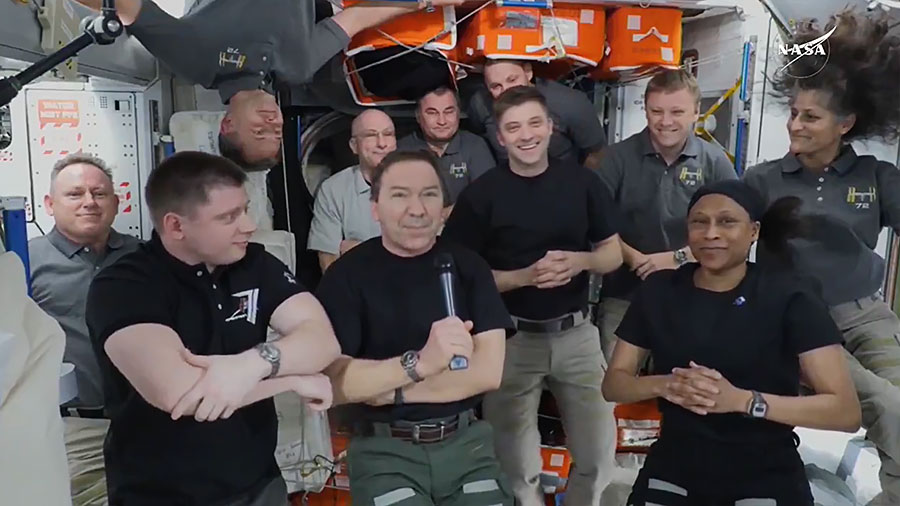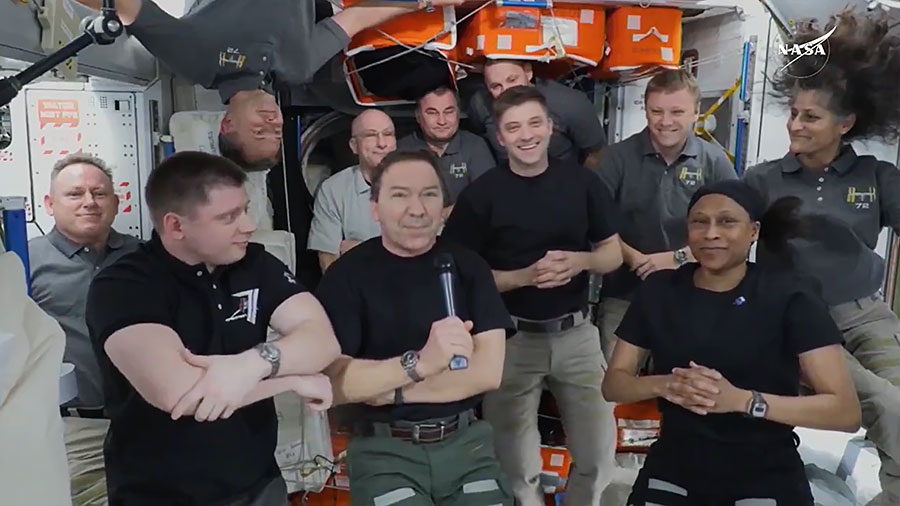
The Expedition 72 crew members explored how space affects exercise and plant growth on Thursday helping NASA and its international partners plan human missions farther away from Earth. The International Space Station residents are also preparing for the departure of four crewmates and continuing to maintain science and life support systems.
The lack of gravity accelerates the loss of bone and muscle mass in crew members living and working in the weightless environment of space. As a result, astronauts exercise for two hours every day to counter the space-caused physical deconditioning and maintain their health ensuring mission success. Researchers monitored NASA Flight Engineer Nick Hague as he pedaled on an exercise cycle while attached sensors and wearing breathing gear that measured his aerobic capacity. Roscosmos Flight Engineer Ivan Vagner jogged on a treadmill for a regularly scheduled fitness evaluation. Researchers monitor the workout sessions and analyze the data to ensure safe and effective workouts while living in microgravity.
Hague also joined station Commander Suni Williams and Flight Engineer Butch Wilmore, both NASA astronauts, and reviewed emergency hardware and procedures in the SpaceX Dragon Freedom spacecraft. The NASA trio then teamed up with Roscosmos Flight Engineer Aleksandr Gorbunov and called down to Earth for a conference with SpaceX mission controllers. Gorbunov launched to space aboard Freedom with Hague on Sept. 28. Williams and Wilmore will return to Earth with the Freedom duo in February of 2025.
NASA Flight Engineers Matthew Dominick and Mike Barratt spent all day Thursday studying how to water plants in space. Barratt set up space botany hardware in the Harmony module while Dominick performed research operations for the Plant Water Management 5 experiment. The investigation explores using low-gravity watering methods such as hydroponics and aeroponics to support plant growth in space.
NASA Flight Engineers Don Pettit and Jeanette Epps focused on science maintenance during their shifts on Thursday. Pettit calibrated biology imaging hardware in the Kibo laboratory module that can detect space-caused inflammatory changes in organisms. Epps packed stem cell research hardware for return to Earth then powered down the KERMIT fluorescence microscope used to image the stem cell samples.
Meanwhile, Epps and her fellow SpaceX Crew-8 crewmates Dominick, Barratt, and Roscosmos cosmonaut Alexander Grebenkin called to Mission Control in Houston on Thursday and gave their farewell remarks. The Commercial Crew quartet is targeted to undock from the Harmony’s space-facing port aboard SpaceX Dragon Endeavour no earlier than 3:05 a.m. EDT on Sunday, weather pending. NASA+ will broadcast the crew departure activities and Dragon’s parachute-assisted splashdown the following day at a site to be determined. Learn how to watch NASA content through a variety of platforms, including social media.
Watch the farewell remarks on YouTube.
Finally, Roscosmos cosmonaut Alexey Ovchinin started his day on a space physics experiment studying how free-flying objects in microgravity move in relation to the speed and trajectory of the space station. Afterward, he spent the rest of his day servicing Roscosmos computers and ventilation systems.
Learn more about station activities by following the space station blog, @space_station and @ISS_Research on X, as well as the ISS Facebook and ISS Instagram accounts.
Get weekly video highlights at: https://roundupreads.jsc.nasa.gov/videoupdate/
Get the latest from NASA delivered every week. Subscribe here: www.nasa.gov/subscribe

